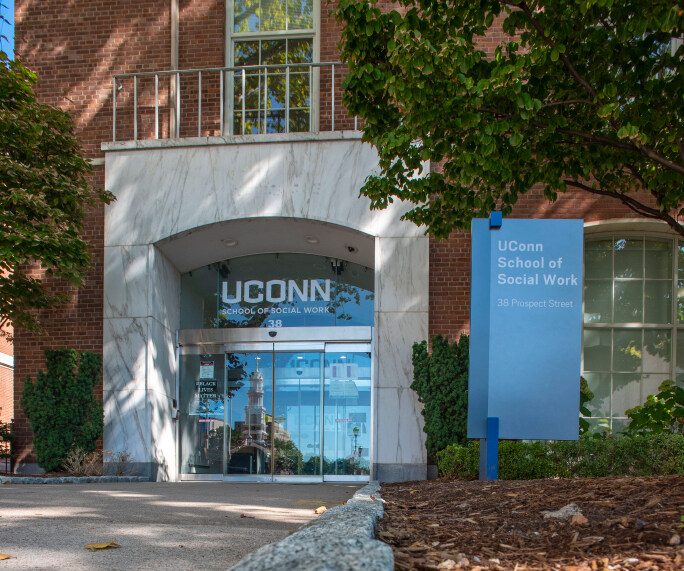Two UConn School of Social Work faculty, Meg Feely, Ph.D., and Ann Marie Garran, Ph.D., MSW, LCSW, have joined a national mission to investigate whether increasing economic support to low-income families can improve child maltreatment outcomes.
The project, Empower Parenting with Resources (EmPwR), received $350,000 in funding from the William T. Grant Foundation, and is the first large scale study in the U.S. to evaluate how families identified by the Illinois Department of Children and Family Services as at risk of child maltreatment respond to strengthened financial security. Researchers hope to ultimately determine if monthly cash gifts over the course of a year prevent future involvement with the Illinois child welfare system by randomly assigning 800 families who are receiving services through the Intact Family Services program to receive a monthly stipend. This is one of the first studies to test this type of intervention across varying geographies (urban to rural), tailor it for child welfare involved families, and explicitly address the role of systemic racism.
Feely and Garran, associate professors at the UConn School of Social Work, began working with EmPwR’s co-principal investigator, Will Schneider, MSW, Ph.D., several years ago.
“We’re looking to understand if and how families’ ability to provide safe and consistent care for their children changes when they have more resources. Additionally, we want to explore the mechanisms, or what types of changes influence improved care when families have more money,” Feely noted.
Child maltreatment, defined as abuse or neglect of a child under the age of 18, remains a substantial problem in the U.S. particularly among families who struggle with meeting their basic economic needs. Feely also says that this program may have important implications for racial and ethnic equity. Compared to their respective presence in the general population, nationally and in Illinois there are a disproportionate number of BIPOC children and families relative to white children and families in the child welfare system.
“Part of our contention is that while individual biases, implicit and explicit, are relevant factors in disproportionality, economic oppression and in particular the impact of structural and systemic racism are the strongest drivers of the racial and ethnic disproportionality in child welfare. For case workers, really understanding the powerful role of systems and structures in shaping and constraining the choices of individuals is an important perspective in comprehending families’ behaviors and choices,” she said, explaining this is why she is thrilled with the anti-racist and anti-oppressive process lens Garran brings to this project.
“Ann Marie is someone I not only enjoy working with, but one of the best people in the country to do this work,” Feely noted.
Garran, who has been at UConn for 15 years, has lectured nationally and internationally on anti-racism, anti-oppression, and inequality. She is a published author on those topics and regularly leads trainings across the U.S. including one with this project, which will help case workers understand their socialization, how that creates implicit biases, and the ways that structural inequality and economic oppression unknowingly influence those biases, assumptions, and stereotypes.
“I was brought in on this project because of my expertise in anti-racism, but also to help understand the case worker’s mindset in terms of their work with the families,” she said.
Garran will work with both the families and case workers to understand their own values, belief systems, and biases that come into play, such as, “What will it mean to them to be a part of this study in terms of cash transfers for families? Are these families deserving of this money, why or why not?” She will also encourage them to move away from a stance of blaming individuals for their circumstances, instead considering the ways that structural oppression influences the options available to families and their decision-making processes.
Feely, Garran, and their research team will compare the outcomes of families who receive the subsidies with the families in a control group who do not. The goal: gain a better understanding of whether financial subsidies work for some families more than others in reducing neglect, particularly when it is led by a lack of resources; understand the amount of cash needed and timeframe and determine if the outcomes vary by race or ethnicity, family structure, or type of community (e.g. rural vs suburban). The researchers will also interview families to track if cash transfers improved risk factors for maltreatment such as parents’ mental health, child health, and parental cognitive load.
Read more about the EmPwR program.
